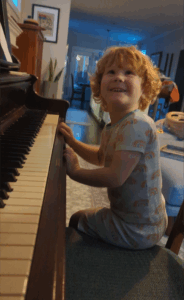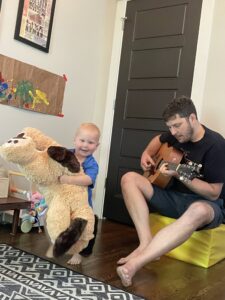25 Sep Asher is Now My Muse: A Conversation Between Will and John
Introduction:
John Armistead Wilson lives with his wife in Nashville, Tennessee and is the father of Asher James Lee Wilson. Asher passed away suddenly and without explanation at the age of three and a half in November 2024.

This blog post is a slightly edited version of an email conversation between John and fellow SUDC parent Will Carrington who lost his daughter Maria in 2002.
Will: Please tell us a bit about your son Asher.
John: First, let me say that your Substack (https://substack.com/@subgameperfect) and book about Maria have been a comfort to me since Asher died, and I am humbled to speak with you. What you have done and continue to do to honor Maria is a testament to your and your family’s love for her.
 Back to your question, Asher had the kindest and gentlest personality you would never expect from a toddler. Our nanny told us once that in decades of working with children she had never met a kid as kind to animals and other children. His first childhood friend was a cancer survivor, and the sweetness he showed her would bring you to your knees. He loved to read, often asking us for multiple books per night. Eventually he had gotten to the point of reading and counting to himself. One of our favorites because of the simplicity and illustrations was the Egg by Amy Sky Koster. Sure, he played like any toddler boy. He loved monster trucks and diggers. He built spaceships with magna-tiles and elaborate Duplo train tracks. But the kindness and thoughtful care he had for others always shined.
Back to your question, Asher had the kindest and gentlest personality you would never expect from a toddler. Our nanny told us once that in decades of working with children she had never met a kid as kind to animals and other children. His first childhood friend was a cancer survivor, and the sweetness he showed her would bring you to your knees. He loved to read, often asking us for multiple books per night. Eventually he had gotten to the point of reading and counting to himself. One of our favorites because of the simplicity and illustrations was the Egg by Amy Sky Koster. Sure, he played like any toddler boy. He loved monster trucks and diggers. He built spaceships with magna-tiles and elaborate Duplo train tracks. But the kindness and thoughtful care he had for others always shined.
 Like many parents feel I’m sure, Asher is the only person who ever truly understood me. I have always felt like a bit of a loner, even though I have always had loving parents, an older brother whom I admire and some dear friends over the years. But Asher knew just what to say to me and how to say it. Wise beyond his years, Asher was like that with everyone and everything. He was a very empathetic and caring young boy.
Like many parents feel I’m sure, Asher is the only person who ever truly understood me. I have always felt like a bit of a loner, even though I have always had loving parents, an older brother whom I admire and some dear friends over the years. But Asher knew just what to say to me and how to say it. Wise beyond his years, Asher was like that with everyone and everything. He was a very empathetic and caring young boy.
Will: We’ll get to the music you’ve made after Asher’s death but first tell us a bit about your relationship to music creation before that happened.
John: I grew up as a theater kid in Concord, Massachusetts. My chorus teacher Mr. Brown made a huge impression on me in terms of believing that music could bring people together. My Mom and Dad grew up in music hubs (Nashville and Tulsa, respectively) and so they raised me to love music from a young age. Mom sang, Dad played guitar around the campfire, and they bought me my first guitar when I was thirteen. That’s when I began to study great songwriters like Bob Dylan and to write my first songs.
I was around twenty years old on our last trip to visit my Nashville grandmother. We bought tickets to a songwriters showcase at the famous Bluebird Café to raise funds for a local hospice. Singing songs to support end-of-life care struck me as a poignant and clever way to channel grief. I continued to play as a college student in Los Angeles, and I wrote more after college. Seeing Rivers Rutherford sing “When I Get Where I’m Going” – a song made famous by Brad Paisley and Dolly Parton – again showed me that songwriting could help grievers feel less alone.
I hung up my guitar while I pursued a good job to raise a family on. I eventually went to work in the music industry and that led me to business school in Nashville. My career for the last ten-plus years has focused on data analytics in healthcare and hospitality. But it was only a matter of time before I got back to writing music.
Will: Did you have a favorite lullaby for Asher? And what other types of music did you and he enjoy together?
John: Elizabeth Mitchell or Raffi played from our Alexa speaker about every day of his life. He loved to dance and study the words, especially one children’s song he learned in music class about sandpiper birds. We put silly songs like “Asher James is my name . . .” to the tune of Brahms’ lullaby. My wife Ali often sang “Dream a Little Dream” to him in the womb. And of course, “Twinkle, Twinkle Little Star” as we began sleep training.
Only a week or two before his death, he learned to push the buttons on his CD player. I liked the song “I Don’t Want to Live on the Moon” by Ernie (from Sesame Street) because it’s about spending time with your loved ones, and he played it on repeat. My brother played the song at Asher’s natural burial service. It was a very cathartic and moving experience.
Will: I’m grateful for the lovely and moving songs that you’ve written and recorded in the months since Asher’s passing. Would these songs exist if Asher were still here?
John: Thank you. I had wanted to take up songwriting “after the kids were out of the house,” but I urgently needed to write songs after Asher’s death. Songwriting has become a life raft. Joni Mitchell has said that time provides perspective after loss. I don’t think I had that choice.
My EP is so literal and personal that I could have never written those precise songs before Asher’s passing. I believe any good writer should be able dress in the skin as their subjects, like songwriter Tia Sillers (“I Hope You Dance”) has described. I am grateful that Asher’s best friend’s mom, a widow, introduced me to my producer (https://www.instagram.com/starbirdsound/) without whom none of this would be possible. I practice and study to write better songs, but there is something in every song that reminds me of Asher. For example, my song: “Heartache, USA” tells the story of writing him a postcard without explicitly talking about him as I do in the other songs. Now that he’s out of the house, it’s all I can do to feel closer to him.
Will: Grieving parents often struggle with the sense that memories of their children will become less intense and more opaque as the time since the loss increases. Would you agree with that and, if so, how does your music help you moderate that sensation?
John: Yes, it reminds me of an early part of your wonderful book about Maria, Taj Mahal. I believe you call it the phase of wanting to grab every random stranger on the street by the collar and screaming, “don’t you understand??” I wrote my first EP while I was in that phase and listening to it again transports me back to that period of unbridled grief, Like Alison Krauss I like to save the music for when I need it.
We visited Selah Carefarm, a retreat for bereaved parents in Sedona, Arizona. There, in between sessions, my song “Little Things” poured quickly out of me. That was when I realized I would use songwriting as my main way to process grief. There, we also got into a routine of lighting palo santo incense as we “pray” or meditate and think about him.
I used to think I needed to go back to that time of raw grief. Now, I use that incense to welcome the memories and love into my mind today. Asher is my muse now.
Will: What music have you turned to since Asher’s passing, and what does it do for you? As we discussed, I played REM’s “Automatic for the People” almost every day for about a year after the death of my own daughter.
John: Since last year, I have dived deep into music by or about the bereaved. Robert Plant, for example, strikes me as the most famous and talented bereaved father. His music with Alison Krauss is a balm. More contemporary country artist Madeline Edwards “Sunshine in the Rain” is about her brother’s suicide and “Beam Me Up” by Pink is beautiful song written by bereaved father Billy Mann.
I have a collection of my most beloved Americana or country songs about grief and child loss on a Spotify playlist called Compassionate Friends if anyone wants to hear them. All my material is on it too.
Will: How can readers access your music, John?
John: I am on all the streaming platforms, Tik Tok, and Instagram under my middle name John Armistead. Fellow SUDC parents and family can download my new song “Toll Keeper” by subscribing to my email list (link: https://forms.gle/5XCAhbrzPTgZiY4z6). I would also invite parents to write a “Heartache, USA” postcard to their lost loves by ordering one at my website: johnarmisteadmusic.com, and I may read it on social media so that we can build a community around sharing in the grief through music.



